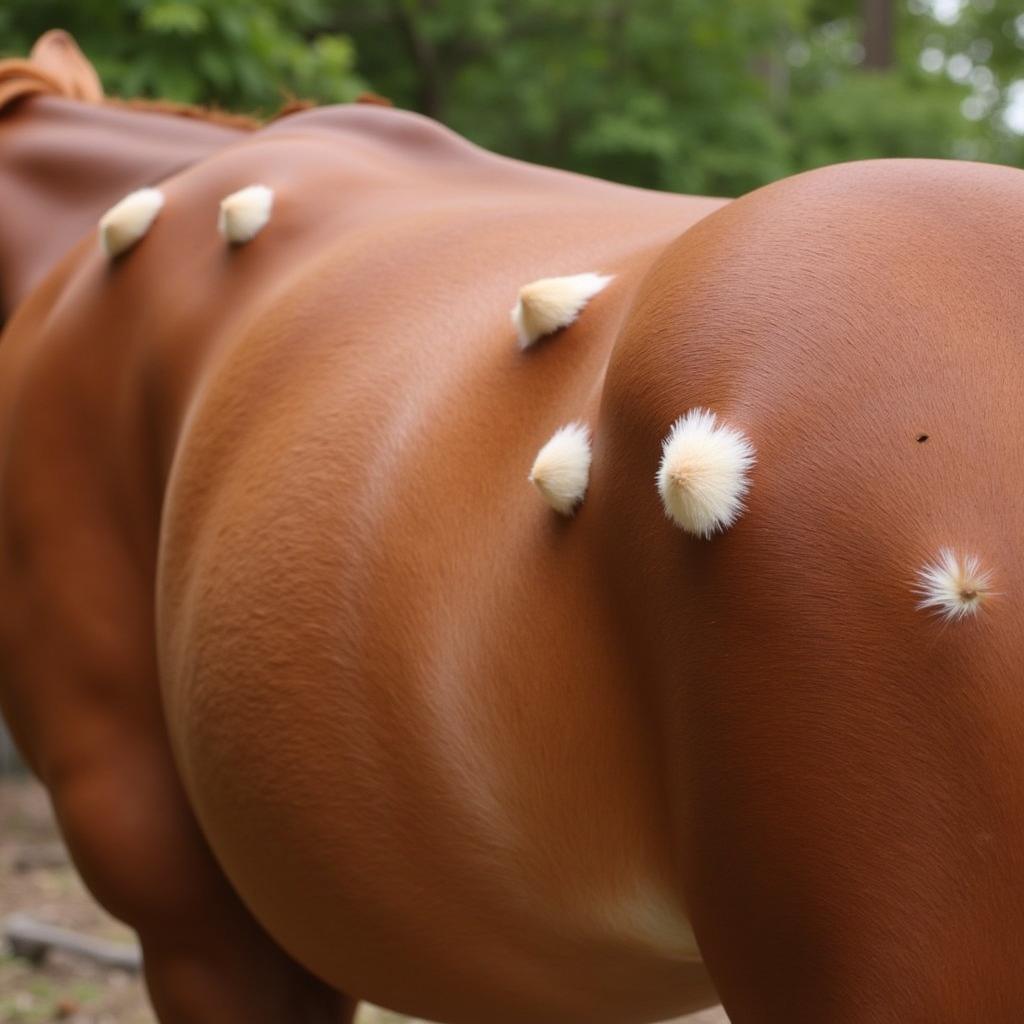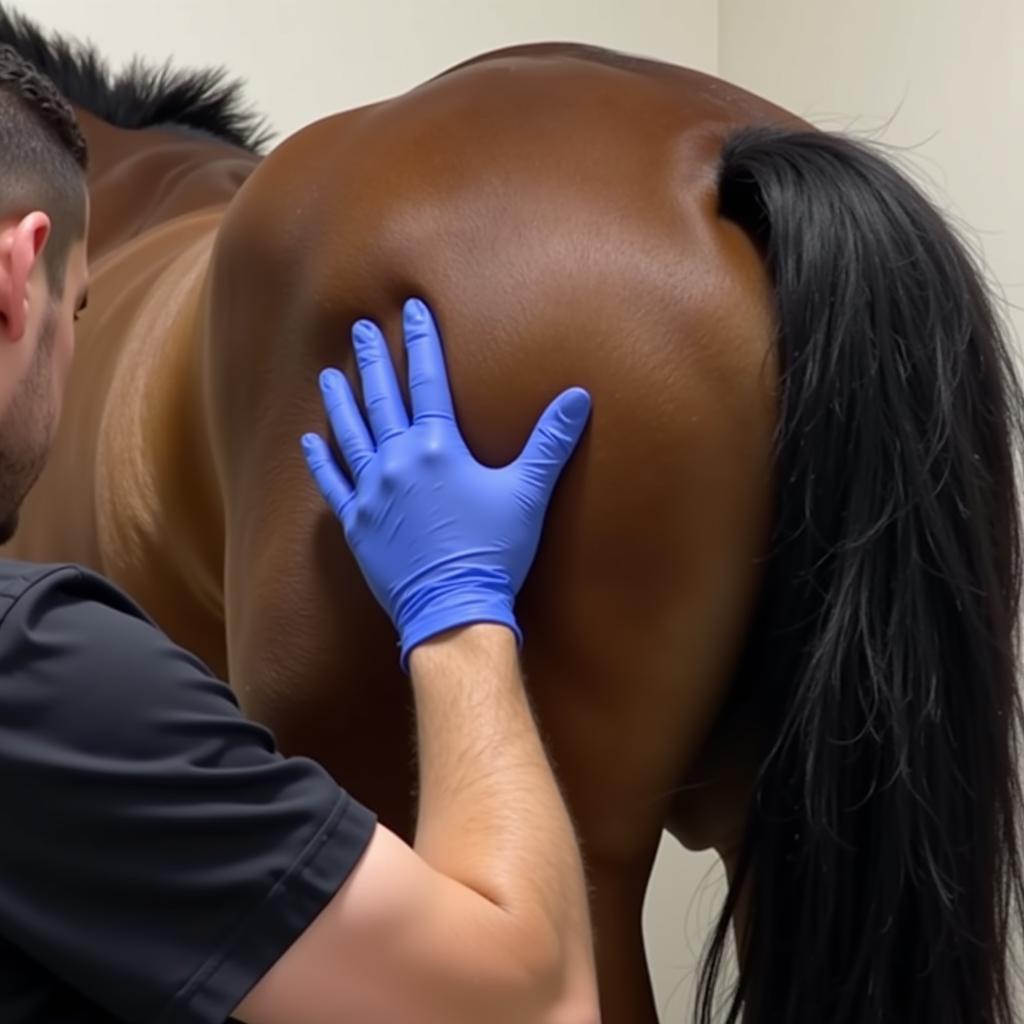A “Knotty Horse” isn’t about a horse’s temperament, but rather a common muscle issue many horse owners face. These “knots,” medically known as muscle spasms, can cause discomfort and even lameness in horses. In this comprehensive guide, we’ll delve into the causes of muscle spasms in horses, explore effective treatments, and provide valuable tips for prevention. Understanding the underlying reasons and proactive measures can help ensure your equine companion stays comfortable and performs at their best.
What Causes Muscles Knots in Horses?
Muscle spasms in horses can stem from a variety of factors, often linked to their physical activity and overall well-being. Here are some common culprits:
- Overexertion: Just like human athletes, horses can experience muscle fatigue and strain from strenuous workouts or competitions.
- Dehydration: Adequate water intake is crucial for muscle function. Dehydration can lead to electrolyte imbalances, making muscles more prone to cramping.
- Electrolyte Imbalances: Electrolytes play a vital role in muscle contractions. Imbalances, often caused by sweating during exercise, can disrupt this delicate process.
- Poor Saddle Fit: An ill-fitting saddle can create pressure points and restrict movement, leading to muscle soreness and spasms.
- Underlying Medical Conditions: In some cases, muscle knots might indicate an underlying medical condition such as arthritis or an injury that needs veterinary attention.
 Horse with Muscle Knots on Back
Horse with Muscle Knots on Back
Recognizing the Signs of Muscle Knots in Horses
Detecting muscle knots in horses requires careful observation. Watch for these telltale signs:
- Reluctance to Move: A horse experiencing muscle spasms might show hesitation or stiffness when asked to move, particularly in specific gaits.
- Sensitivity to Touch: Gently palpating the affected area may elicit a flinch or resistance, indicating muscle soreness.
- Changes in Gait: Muscle knots can alter a horse’s way of going, leading to shortened strides, head bobbing, or an uneven gait.
- Behavioral Changes: Horses with muscle pain might display irritability, pinned ears, or a reluctance to be groomed in the affected area.
 Veterinarian Examining Horse for Muscle Tension
Veterinarian Examining Horse for Muscle Tension
Effective Treatments for Knotty Horses
Addressing muscle spasms promptly is essential to alleviate discomfort and prevent further complications. Here are some effective treatment options:
- Rest and Recovery: Allowing the horse adequate time to rest and recover from strenuous activity is crucial for muscle healing.
- Massage Therapy: Equine massage therapists can use specialized techniques to release muscle tension and improve circulation.
- Stretching Exercises: Gentle stretching exercises, guided by a professional, can help improve flexibility and reduce muscle tightness.
- Heat Therapy: Applying heat to the affected area can relax muscles and increase blood flow, promoting healing.
- Medications: In some cases, a veterinarian might prescribe pain relievers or muscle relaxants to alleviate discomfort and reduce inflammation.
Preventing Muscle Spasms in Horses
Prevention is always better than cure. Incorporate these practices into your horse care routine:
- Warm-up and Cool-down: Always allow for proper warm-up before exercise and cool-down afterward to prepare muscles for exertion and aid in recovery.
- Balanced Diet: Provide your horse with a balanced diet that meets their nutritional needs, including essential vitamins and minerals for muscle health.
- Hydration: Ensure your horse has access to fresh, clean water at all times, especially during hot weather and after exercise.
- Electrolyte Supplementation: Consult with your veterinarian about appropriate electrolyte supplementation, especially during periods of intense training or competition.
- Regular Saddle Fitting: Schedule regular saddle fitting appointments with a qualified saddle fitter to ensure a comfortable and proper fit.
 Horse and Owner Enjoying a Relaxing Trail Ride
Horse and Owner Enjoying a Relaxing Trail Ride
Conclusion
Muscle knots, or spasms, are a common issue that can affect a horse’s comfort and performance. By understanding the causes, recognizing the signs, and implementing effective treatments and preventative measures, you can play a proactive role in maintaining your equine companion’s well-being. Remember, early detection and prompt action are crucial for resolving muscle issues and ensuring your horse stays happy, healthy, and ready to perform at its best.
Do you have any questions or concerns about muscle knots in horses? Contact Justus Horses USA at 0772127271 or [email protected]. Our team of experts is here to provide guidance and support to ensure the health and happiness of your equine partner. You can also visit our facility at QGM2+WX2, Vị Trung, Vị Thuỷ, Hậu Giang, Việt Nam, for personalized assistance and expert care. We’re available 24/7 to address your needs.